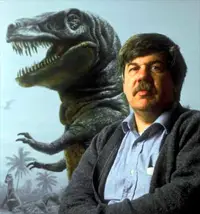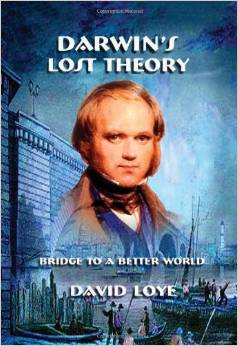|
TRANSLATE THIS ARTICLE
Integral World: Exploring Theories of Everything
An independent forum for a critical discussion of the integral philosophy of Ken Wilber
 David Loye is the founder and initiating developer and facilitator of The Darwin Project and the prospective Great Adventure distance-learning and theory-building programs. He is the author of: Darwin's Lost Theory of Love, which has now been expanded into a six book Darwin Anniversary Cycle. So far Darwin's Lost Theory, Darwin on Love, Bankrolling Evolution, and Measuring Evolution have been published.
See also: www.thedarwinproject.com David Loye is the founder and initiating developer and facilitator of The Darwin Project and the prospective Great Adventure distance-learning and theory-building programs. He is the author of: Darwin's Lost Theory of Love, which has now been expanded into a six book Darwin Anniversary Cycle. So far Darwin's Lost Theory, Darwin on Love, Bankrolling Evolution, and Measuring Evolution have been published.
See also: www.thedarwinproject.comDARWIN AND WILBERDavid LoyeFor Darwin the prime driver for human evolution was and is... our capacity for the "moral sense".
Darwin and Wilber? Well, of course the world knows the two are just about as far apart as you could get. Darwin the horrendous icon of survival of the fittest and selfish genes, Wilber the liberating purveyor of evolutionary enlightenment now as well as next. Nearly fifteen years ago, however, I began to suspect something very big was being left out of what we've been taught, and this year everywhere celebrate, about Darwin and his theory of evolution. Having gained my credentials, prestigious faculty posts, and publication of influential books as a psychologist, sociologist, and evolutionary systems scientist, I decided to apply what is known as content analysis by word count to Darwin's Descent of Man. This is the book in which he specifically tells us he's now moving on from the study of prehuman evolution to what chiefly drives us at our own species level of emergence. "I have been led to put together my notes, so as to see how far the general conclusions arrived at in my former works were applicable to man," he writes in the Introduction. What happened thereafter has led me to realize that Wilberian scholars, which although an admirer, I am not, may very well find the two are actually very much in tune. The picture I sense being that out of his genius and intuition at an earlier time of less knowledge than we have today—including the ancient wave out of Eastern spirituality—Darwin was groping toward the expansion of thought about evolution with which Wilber is so heavily identified today. I had an electronic copy of Descent that made possible a computerized word search. So into the FIND slot I entered the first phrase that came to mind: survival of the fittest. Thereafter I found what nowhere in the world today, in celebrations staged by the well-educated and the wealthy on every continent, is even being mentioned. Only twice in that whole book of 475 fine print pages did this universally prevailing tag for Darwin's theory of evolution appear. And once was to apologize for ever using the term! How about an exact opposite? What about, well, why not try "love"? Into the slot it went and a split-second later I had the tally. In The Descent of Man Darwin writes 95 times about love. Astounded, I checked the Index. I found that in this index that after 100 years, in every edition, in all the main languages for our species throughout our world even today, there is only a single entry. One entry for love—versus 95 times in the text for Descent. What about the other prevailing tag for Darwin today: the idea of "selfish genes"? Or more broadly, that along with "survival of the fittest," at the core the other prime driver for our species on this planet is selfishness—which sociobiologists and evolutionary psychologists tell us even drives our naive illusion of a transcendent altruism. Selfishness, Darwin tells us, is a "base principle," which accounts for the "low morality of savages." What then might be the polar opposite for selfishness? Why not try the word "moral"? Of moral sensitivity I found he wrote 92 times—versus 6 entries in the Index. Of competition, he wrote 12 times; of cooperation—called mutuality or mutual aid in Darwin's time—27 times. To make a long story short, I went on to discover the enormous difference it makes if you approach Descent not with a mind shuttered by what is an old and by now considerably updated paradigm for biology, but expanded with the multidisciplinary perspective of modern evolutionary systems science. I discovered that in this his key book on human evolution, Darwin does, yes, continue to stress the well-established scientific evidence for the impact of natural selection and the drive of selfishness. But he goes on to insist that "other agencies" become of much greater importance at our level of evolutionary emergence. Most important: he clearly outlines a compelling and carefully reasoned moral and action-oriented completion for his theory of evolution. The Lost DarwinFurther missing from the museum exhibits, symposia, books, and other celebrations of this his 200th birthday anniversary year, I uncovered that for Darwin the prime driver for human evolution—and completion for his theory of evolution—was and is not natural selection, or "survival of the fittest," as popularized. It is our capacity for the "moral sense," i.e., moral sensitivity, an evolutionary inbuilt thrust within us for the development of a sense of right versus wrong. In further probing the relation of love to moral sensitivity, he develops his theory of the development of the moral sense in our species through, first, the primordial emergence of the sexual instinct among organisms, followed by the emergence over time of a parental instinct, a social instinct, and finally the capacity for emotion and reason. In a complementary analysis he develops a powerful social psychological case for how during our evolution the origin of caring for others, led to reflection on the consequences of one's behavior, led to the development of language to share and compare insights, with repetition of this shared mindset over time, through habit, then cementing in place the global guidance of right versus wrong reflected in our customs, norms, rules, values, and morals. Functionally, his completed theory consists of two halves. There is a foundation, primarily established by the interaction of natural selection and variation, the domain of natural science, of which he wrote in Origin of Species. And there is a completing superstructure, the domain of social science, of which he wrote in The Descent of Man, in which, through a process of both personal and mass cultural maturation, the thrust of the moral sense and impact of social psychological development unfolds. Point for point, this instinct and psychological emergent pattern for his completion of his theory of evolution is corroborated by the research of two of the greatest modern brain scientists, Paul MacLean, and—for proof of the evolutionary thrust of the active brain?Karl Pribram. The completed theory is further corroborated by modern paleontology, anthropology, developmental psychology, and linguistic theory. One hundred years earlier, Darwin clearly foreshadows Abraham Maslow's defense, to growth, to metamotivational thrust for the development of humanistic psychology and the human potentials movement. Among the currently "hottest" topics for science in our time, his long ignored key insights even anticipate key aspects of the development of chaos, complexity, and self-organizing theory. Finally, Darwin was definitely not the enemy of religion. For him the ignorance, the violence, and the lunacy of regressive religion was an abomination. But for progressive religion he not only expressed a kinship but also a strong alignment. Here, for example, is the quote of quotes—which comes up not buried in some obscure place easy to miss. It appears on the next to the very last page for the section of Descent clearly labeled Concluding Remarks. In other words, it's obvious Darwin wanted to be sure his readers carried this conclusion away from this long book and his lifelong quest to understand and explain the evolution of all life on this planet, including ours. "Important as the struggle for existence has been and even still is, yet as far as the highest part of our nature is concerned there are other agencies more important. "For the moral qualities are advanced either directly or indirectly much more through the efforts of habit, by our reasoning powers, by instruction, by religion, etc., than through natural selection." Why Does This Matter? Stephen Jay Gould (1941-2002) Why is this anything more than one more for the stack of tales of something gone wrong, which for a few minutes we respond to but then regretfully shrug off? All one must do is contemplate what our world could have been like if Darwin's lost theory had been resurrected early and allowed to influence the development of both the science and the religion of the 20th century. The most popular Darwinian of his time, paleontologist Stephen J.Gould, repeatedly noted the relation of survival of the fittest Darwinism to the wars of the 20th century and the rise of Hitler and the Nazis in Germany. Indeed, a close look at the survival of the fittest/selfish genes syndrome reveals that among the ills of humanity this is the mindset of fascism wherever it rises. Foreshadowing global financial meltdown, American billionaire George Soros, management scientists, and economists decried the devastation of this mindset in industry. It is by no means the cause of everything gone bad, but in my own work, through persistent systems analysis, I've further uncovered the connection of this pseudoDarwinian mindset to most of what now threatens us in the 21st century?in particular, the widening gap between rich and poor, population explosion, environmental devastation, nuclear overkill, the surge of regressive religion, and the valuing of male and "macho" values over female and "feminine" values, white over black and other "off-colors," and acceleration of all the above. Determined to end the generation after generation transmittal of this disastrous mindset during my life time, I recruited a Council of over fifty leading American, European, and Asia scientists and educators to form a multinational Darwin Project to encourage a shift in our homes, schools, and the media from only teaching 'first-half' Darwinism to the valuing of moral sensitivity and love in Darwin's completing half for theory and story (see www.thedarwinproject.com). I've further expanded my lonely earlier attempt to get the word out in the finally self-published Darwin's Lost Theory of Love into a six book Darwin Anniversary Cycle. So far Darwin's Lost Theory, Darwin on Love, Bankrolling Evolution, and Measuring Evolution have been published and are at last out there worldwide with all online book sellers to help push through the old paradigm to reach mainstream and, most critically, world leadership mind. I hope this may inspire Wilberian scholars to explore what I see now as a long lost connection between the grand old man and chief originator of evolutionary theory and Wilber's expanding and enormously popular exploration here in the crucial beginning years for the 21st century. It's a story, I feel, that could reach out to a whole new realm of readers and upgrading evolutionary activists. RELATED ESSAYSElliot Benjamin, "Love, Evolution and Higher Values in Darwin", February 2009, www.integralworld.net Frank Visser, "Duplicating Darwin: Ken Wilber's and David Loye's Misreading of Neo-Darwinism", February 2015, www.integralworld.net David Lane & Andrea Diem-Lane, ""Darwin's Moral Sense, The Evolution of a Conscience", February 2015, www.integralworld.net Frank Visser, ""Is Darwin Really 'On Our Side'?, Ken Wilber's Misreading of Neo-Darwinism", June 2017, www.integralworld.net
|
